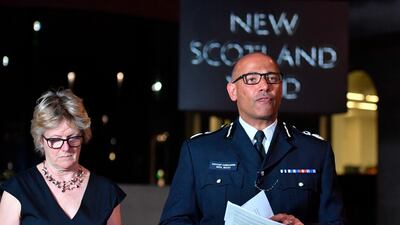English police have confirmed that the couple who were found at the weekend critically ill in the Wiltshire town of Amesbury were exposed to Novichok, the nerve agent that seriously injured a Russian spy and his daughter in Salisbury.
Tests by the chemical weapons research centre at nearby Porton Down showed that the substance that almost killed Sergei Skripal and his daughter, Yulia, was found in Dawn Sturgess and Charlie Rowley, who were discovered at their home 13 kilometres from Salisbury, where the Skripals were poisoned in March.
There is no indication if this is from the batch of the toxin used earlier this year.
Neil Basu, Metropolitan Police Assistant Commissioner of Specialist Operations, said: “The latest update we have from the hospital is that both patients remain in a critical condition. Both are British nationals and are local to the area. Officers are still working to identify their next of kin.
“At this stage, no one else has presented with the same symptoms linked to this incident. The priority for the investigation team now, is to establish how these two people have come into contact with this nerve agent.
"Around 100 detectives from the Counter Terrorism Policing Network are now working on this investigation, alongside colleagues from Wiltshire Police."
Wiltshire Police declared the case a "major incident" on Wednesday, four days after Ms Sturgess and Rowley were found collapsed at a residential building in Amesbury. A major incident designation allows British authorities to mobilise more than one emergency agency.
Residents felt a sense of deja vu.
"With the Russian attack happening not long ago, we just assumed the worst," said student Chloe Edwards, who said police and fire engines descended on a quiet street of newly built homes in Amesbury on Saturday evening.
Ms Edwards said she saw people in green suits – like those worn by forensics officers – and her family was told to stay indoors for several hours.
Police said officers were initially called on Saturday morning about a collapsed woman, then were summoned back in the evening after a man fell ill at the same property. Police at first thought the couple, identified by friends as Ms Sturgess, 44, and Rowley, 45, had taken a contaminated batch of heroin or crack.
Rowley was jailed for possession of heroin in November 2015.
“However, further testing is now ongoing to establish the substance which led to these patients becoming ill,” said Deputy Chief Constable Paul Mills. “At this stage it is not yet clear if a crime has been committed.”
_______________
Read more:
Amesbury: UK counter terror police brought in to probe incident near Skripal poisoning
What is Novichok, the nerve agent believed to have been used against Sergei Skripal?
_______________
London's Metropolitan Police had said that "given the recent events in Salisbury", counter-terrorism officers were working with local police on the investigation.
Prime Minister Theresa May's office said she was being kept updated on the case, "which understandably is being treated with the utmost seriousness".
The emergency services' response echoes that in the case of Skripal, 67. The former Russian intelligence officer was convicted of spying for Britain before coming to the UK as part of a 2010 prisoner swap.
He had been living in Salisbury, a cathedral city 145 kilometres south-west of London, when he was struck down along with his daughter Yulia, 33, who was visiting him.
The Skripals' illness baffled doctors after father and daughter were found unconscious on a park bench in Salisbury. Scientists at Porton Down concluded they had been poisoned with Novichok, a type of nerve agent developed by the Soviet Union during the Cold War.
After spending weeks in critical condition, the Skripals were released from the hospital and taken to an undisclosed location for their protection. Doctors say they do not know the pair's long-term prognosis.
Britain accuses Russia of poisoning the Skripals, a claim that Moscow denies. The case sparked a diplomatic crisis between Russia and the West, including the expulsion of hundreds of diplomats from both sides.
The two Amesbury victims were at Salisbury District Hospital, which also treated the Skripals.
Neighbours on Muggleton Road in Amesbury, where Rowley is believed to live, said they did not know the couple well and did not know what they did for a living. Most residents have only recently moved to the new houses and flats.
Sam Hobson, a friend of the couple, said he was with them on Saturday, when Ms Sturgess fell ill first. He told Sky News she was “having a fit, foam coming out of her mouth”.
Mr Rowley collapsed later.
"He was sweating loads, dribbling... He was rocking backwards and forwards," Mr Hobson said. "There was no response from him. He didn't even know I was there."
Police cordoned off a home in Amesbury, believed to be Rowley's, and other places the pair visited, including a church, a pharmacy and a park in Salisbury, near where the Skripals were found.
Health officials said there appears to be no wider threat to the public, but they are watching the situation.
Salisbury and surrounding towns have only recently begun to recover from weeks at the centre of an international spy drama.
Police from 40 departments in England and Wales returned home in June after months working on the Skripal case, and specially trained workers have spent months decontaminating sites around the city.
The British government has pledged £2.5 million (Dh12.1m) to local businesses to make up for lost revenue in the area, which is a gateway to Stonehenge, the ancient stone circle that is a huge tourist destination.
Justin Doughty, who lives across the street from the cordoned-off house, said residents want more information from the authorities.
"We don't know, to be honest now, because is it linked to Salisbury or is it drug-related?" he said. "None of us is being told anything by the police, and it would be nice to know something."

